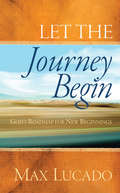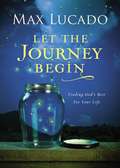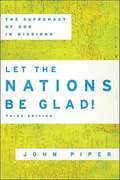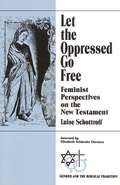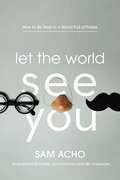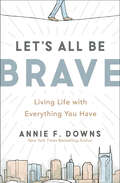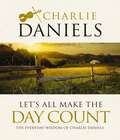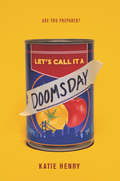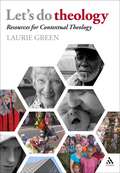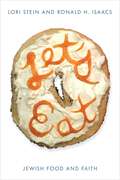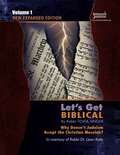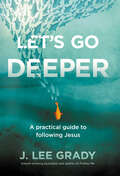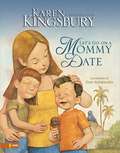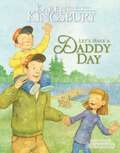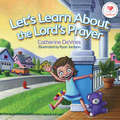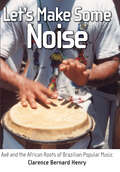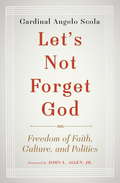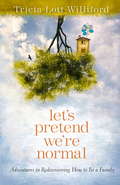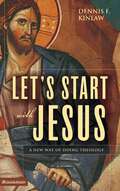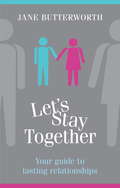- Table View
- List View
Let the Journey Begin
by Max LucadoPowerful, life-changing messages for a vital time in life.Graduation is a time of excitement and uncertainty. For graduates the question is, will they face the future with or without God? Let the Journey Beginrepack is filled with godly wisdom, encouragement, and guidance from bestselling and trusted author Max Lucado for students about to embark on new steps in their life journey. Graduates will be reassured that they are not alone--God is with them every step of their way.This bestselling book will include thirty-two additional pages of new content, all consisting of excerpts, quotes, and scripture as well as an updated interior design to appeal to a new generation of graduates. Included are pages for personal goals, favorite verses of scripture, and prayers. Trim Size: 5 x 7
Let the Journey Begin: Finding God's Best for Your Life
by Max LucadoAre you looking for a special gift for a graduate? Let the Journey Begin is filled with godly wisdom, encouragement, and guidance from bestselling and trusted author Max Lucado for students about to embark on new steps in their life journey. Graduates will be reassured that they are not alone--God is with them every step of their way. Let the Journey Begin includes:Dozens of easy-to-read writings divided into five themed sections: God's Plan for the Journey of Life--A Road Map for Success; Stop, Look, and Listen--Good Habits for a Good Journey; A Fork in the Road--Deciding Which Way to Go; Dangers and Detours Ahead--Slow Down, Avoid Disaster; and Two Is Fine Company--A Friend for the Journey32 additional pages that include excerpts, quotes, and scriptureSpecial pages for graduates to log personal goals, favorite verses of scripture, and prayers For graduates the question is, will they face the future with or without God? Max Lucado's Let the Journey Begin has powerful, life-changing messages for a vital time in life.
Let the Nations be Glad!: The Supremacy of God in Missions
by John PiperThis new edition draws on key biblical texts to demonstrate that worship is the ultimate goal of the church and that proper worship is the ultimate goal of the church and that proper worship fuels missionary outreach. John Piper offers a biblical defense of God's supremacy in all things, providing readers with a sound theological foundation for missions.
Let the Oppressed Go Free: Feminist Perspectives on the New Testament
by Luise Schottroff Annamarie S. KidderThis book draws together fascinating recent studies by a leading European scholar of aspects of the New Testament of special interest to women. These essays, translated for the first time, will deepen feminist scholarship in the English-speaking world.
Let the Whole Church Say Amen!: A Guide for Those Who Pray in Public
by Laurence Hull StookeyStookey seeks to relieve the anxiety of inexperienced leaders of public prayer and the discomfort of those with and for whom they pray in this practical guide to the art of praying in public. The book has three parts. First, Stookey offers reflections on the nature of prayer, utilizing the image of a flow of energy. Second, he discusses the forms, mechanics, and vocabularies of prayer. His analysis brims with insight and practical application. Third, and most importantly, he provides concrete exercises in editing prayers. The reader is challenged to mark prayer texts and then to compare her or his own work with the author's as Stookey points out the particular issues that the exercises highlights. The book is clearly organized, economically written, and easy to use. Those who read carefully and complete the exercises will gain significant experience in crafting prayers to which the whole congregation can respond with an enthusiastic "Amen".
Let the World See You: How to Be Real in a World Full of Fakes
by Sam AchoNFL linebacker, speaker, podcaster, and humanitarian Sam Acho gives a blueprint for taking off our masks and living lives of genuine authenticity.Most of us hide. We play small and don't live up to our full potential. Sam Acho was one of those people. As an NFL linebacker, for example, he earned his MBA but told no one because he was afraid of what people might think if they found out that he cared about things that weren't "normal" for his profession. After many years of hiding himself, the person he had become had no connection to the real Sam. Only when he lost a friend and a mentor did he realize he was doing it all wrong--just like many us do, when we try to become someone we're not. All the while, we ignore the unique gifts and talents and personality we truly possess.But there is another way of living: Let the world see you. Your quirks, your passions, and your inner desires were not given to you by accident. And the world needs your gifts.In Let the World See You, Sam Acho shares lessons from his own life as well as stories from others to reveal how you can overcome your fears and discover your true selves. Being the real you pays big. No one else has what you have. No one else can share what you share. Let the World See You helps crack the shell of people who are in hiding and reveals the benefits of a lifestyle lived on purpose.
Let's All Be Brave: Living Life with Everything You Have
by Annie F. DownsHow often does fear hold you back from living your life to the fullest? Join New York Times bestselling author, podcast host, and speaker Annie F. Downs as she shares a call to embrace the God-given courage living inside you.Annie is the first to admit that she's not exactly the bravest woman in the world. Even now, she still cries sometimes when she leaves her parents' home in Georgia, she's never jumped out of a plane, and she only rides roller coasters to impress guys. But Annie knows that courage resides inside each one of us, and she's on a mission to conquer her own fears while encouraging you to do the same.Let's All Be Brave is more than a book; it's a battle cry. Annie uses honest and often humorous illustrations from her own life, contemporary real-life examples from the lives of others, and fascinating biblical stories to challenge you to:Discover God's surprising answers to overcoming fear, uncertainty, and anxietyLet go of the things that hold you back--relationships, comfort zones, expectations, and moreSay yes to both small and big thingsLive boldly and sacrificially for God and othersHold on to hope, trust God, and be brave no matter your circumstancesThis book is your call to step into those places that require courage, giving you the help you need to take the next step forward—even when it's scary.Praise for Let's All Be Brave:"There are certain types of people who are capable of nudging us toward courage without making us feel small or insignificant, and Annie is at the front of the line. She has done that with Let's All Be Brave, and before you even mean to, you are putting your YES on the table."--Jen Hatmaker, New York Times bestselling author of For the Love and Fierce, Free, and Full of Fire
Let's All Make the Day Count: The Everyday Wisdom of Charlie Daniels
by Charlie DanielsBeloved American icon and Grammy Award–winning musician Charlie Daniels shares wit, wisdom, and life lessons he has learned from traveling and playing across the country. Let's All Make the Day Count imparts Charlie’s positive attitude, timeless insight, and powerful spirit, and it will encourage and inspire you to make your day count. Learn how you can make your day count from the encouraging and inspiring Charlie Daniels. Charlie has written a song for Elvis, played on a Bob Dylan album, toured the country for decades, and delighted fans around the world with his fiddle playing and signature hit song "The Devil Went Down to Georgia." More important, he’s dedicated his life to helping others, including children, troubled teens, and veterans.Join Charlie as he shares many of the things he has learned over the years and be encouraged and empowered by his new book, Let's All Make the Day Count. The book includes 100 readings with Bible verses and clever and pithy "Let's All Make the Day Count" statements. Charlie will inspire you with his positive attitude, timeless wisdom, and powerful spirit. Let's All Make the Day Count imparts Charlie’s positive attitude, timeless insight, and powerful spirit, and it will encourage and inspire you to make your day count.
Let's Be Real: Living life as an open and honest you
by Sadie Robertson Natasha BureFrom singer, model and YouTube celebrity Natasha Bure, the daughter of Candace Cameron Bure, comes a real, honest conversational book that doesn’t hold back. Everywhere she goes and every video she posts has one basic message: this is real, this is life, and we all go through it. Whether it’s acne, boyfriends, faith, stress, or having fun, Natasha’s view is to simply be honest, simply be real, no matter what you face. Natasha’s real and relatable tone paired with personal notes and stories will help readers see that living a “real” life is the best life. The dust jacket features embossing.
Let's Begin Again (Seven Sisters Series Book #7)
by Debra White SmithCan Tony and Victoria find their first love again? Victoria feels tony isn't quite opening up and giving his all and Tony is afraid to reveal long hidden secrets...can God help them find their way back to him and to each other?
Let's Call It a Doomsday
by Katie HenryAn engrossing and thoughtful contemporary tale that tackles faith, friendship, family, anxiety, and the potential apocalypse from Katie Henry, the acclaimed author of Heretics Anonymous.There are many ways the world could end. A fire. A catastrophic flood. A super eruption that spews lakes of lava. Ellis Kimball has made note of all possible scenarios, and she is prepared for each one.What she doesn’t expect is meeting Hannah Marks in her therapist’s waiting room. Hannah calls their meeting fate. After all, Ellis is scared about the end of the world; Hannah knows when it’s going to happen.Despite Ellis’s anxiety—about what others think of her, about what she’s doing wrong, about the safety of her loved ones—the two girls become friends. But time is ticking down, and as Ellis tries to help Hannah decipher the details of her doomsday premonition, their search for answers only raises more questions.When does it happen? Who will believe them? And how do you prepare for the end of the world when it feels like your life is just getting started?
Let's Do Theology: Resources for Contextual Theology
by Laurie GreenThis completely updated and revised edition of "Let's Do Theology" is an intensely practical book drawing examples from parish life and educational experience in the UK and overseas. It will describe how to strike the balance between unthinking but faithful action and careful theological reflection. The book offers a proven method for contextual theology, with full analysis and radical critique. It enables ordinary women and men to take part in the theological enterprise .
Let's Eat: Jewish Food and Faith
by Lori Stein Ronald H IsaacsThe food that Jewish people eat is part of our connection to our faith, culture, and history. Not only is Jewish food comforting and delicious, it’s also a link to every facet of Judaism. By learning about and cooking traditional Jewish dishes, we can understand fundamentals such as kashrut, community, and diversity. And Jewish history is so connected to food that one comedian said that the story of Judaism can be condensed into nine words: They tried to kill us. We survived. Let’s eat. Let’s Eat follows the calendar of Jewish holidays to include food from the many different Jewish communities around the world; in doing so, it brings the values that are the foundation of Judaism into focus. It also covers the way these foods have ended up on the Jewish menu and how Jews, as they wandered through the world, have influenced and been influenced by other nations and cuisines. Including over 40 recipes, this delicious review of the role of food in Jewish life offers a lively history alongside the traditions of
Let's Get Biblical!: Why Doesn't Judaism Accept the Christian Messiah?
by Toiva SingerExplore the Jewish and Christian Scriptures with the world renowned Bible scholar and expert on Jewish evangelism, Rabbi Tovia Singer. This new two-volume work, Let’s Get Biblical! Why Doesn’t Judaism Accept the Christian Messiah?, takes the reader on an eye-opening journey through timeless passages in Tanach, and answers a pressing question: Why doesn’t Judaism accept the Christian messiah? Are the teachings conveyed in the New Testament compatible with ageless prophecies in the Jewish Scriptures? <p><p>Rabbi Singer’s fascinating new work clearly illustrates why the core doctrines of the Church are utterly incompatible with the cornerstone principles expressed by the Prophets of Israel, and are opposed by the most cherished tenets conveyed in the Jewish Scriptures. <P><P> Moreover, this book demonstrates how the Church systematically and deliberately altered the Jewish Scriptures in order to persuade potential converts that Jesus is the promised Jewish messiah. To accomplish this feat, Christian “translators” manipulated, misquoted, mistranslated, and even fabricated verses in the Hebrew Scriptures so that these texts appear to be speaking about Jesus. <p><p>This exhaustive book probes and illuminates this thought-provoking subject. Tragically, over the past two millennia, the church’s faithful have been completely oblivious to this Bible-tampering because virtually no Christian can read or understand the Hebrew Scriptures in its original language. Since time immemorial, earnest parishioners blindly and utterly depended upon manmade Christian “translations” of the “Old Testament” in order to understand the “Word of God.” Understandably, churchgoers are deeply puzzled by the Jewish rejection of their religion’s claims. They wonder aloud why Jewish people, who are reared since childhood in the Holy Tongue, and are the bearers and protectors of the sacred Oracles of God, do not accept Jesus as their messiah. How can such an extraordinary people dismiss such an extraordinary claim? Are they just plain stubborn? Let’s Get Biblical thoroughly answers these nagging, age-old questions.
Let's Get Ready For Hanukkah
by Joanne WinneExplains in simple terms some basic concepts about Hanukkah and the traditions surrounding it.
Let's Get Ready for Bed (Nurturing Steps)
by Michael W. Smith Mike NawrockiFrom Grammy Award-winning artist Michael W Smith and the co-creator of Veggietales Mike Nawrocki comes Let's Get Ready for Bed, the second in a series of bedtime books in the Nurturing Steps line. This sweet and sleepy picture book will lull your little one to sleep with their favorite stuffed animal characters the Nighty Nights.As an added bonus, this book includes a link that allows readers to listen to Michael W. Smith singing the lullaby from the story.Founded by Michael W Smith, Nurturing StepsTM is an infant and toddler series of children&’s music and books with a simple mission to enliven a child&’s journey with hope and faith through music and storytelling.
Let's Go Deeper: A Practical Guide to Following Jesus
by J Lee GradyFROM AWARD-WINNING JOURNALIST AND AUTHOR OF FOLLOW METhe only thing holding back the spread of the gospel is the church. This book will teach me how to go deeper in my relationship with God so that I may become a more fully developed disciple of Jesus to help bring the gospel to the world around me. The Bible tells us there is one true God who sits on the throne of the universe. He is the Creator of everything, and He is worthy of all the praise and honor of the world&’s people. Because He is our Creator and the Sustainer of life, He has the right to rule over us and expect obedience. In Let&’s Go Deeper, J. Lee Grady shares how by revealing Himself to Moses, God demonstrated His true desire to be with us. Even though He is almighty, enthroned in the glory of heaven, He makes Himself accessible and available to those who love Him. Join in the journey of discipleship with this practical guide of thirty short and powerful lessons to take you deeper in your relationship with God. This resource will transform your Christian faith and act as a tool kit for those who are new to Christianity. Following Jesus and coming to know your Creator doesn&’t have to be difficult; you just have to be willing to take the first step toward Him.
Let's Go on a Mommy Date
by Karen KingsburySee, time will take you far from here; you’re growing way too fast. All I want is Mommy time to make the moments last. Something we’ll remember so that come some far-off day, you’ll know how much I loved you ‘cause we took the time to play. From inspirational novelist Karen Kingsbury comes this delightful children’s book about Moms and children spending precious time together. Whether it’s the zoo, park, a movie, or simply snuggling down to read about such adventures — being together is what’s required for a “Mommy Date.” This poetic picture book reminds little ones of fun they’ve had, and fun ahead, and brings home the bottom line: spending time together is what Mommy’s really want!
Let's Have a Daddy Day
by Karen Kingsbury“When you’re all grown up and you look back on this day, you’ll know how much I loved you ‘cause we took the time to play.”A Daddy day? Why not! What better way for a child to enjoy being with Daddy—and Dad to enjoy being with his little one? These heartwarming rhymes by bestselling author Karen Kingsbury offer great ideas for children to have simple, fun times with Daddy, and to come up with ideas of their own. Geared for kids and dads alike, this endearingly illustrated book will become a cherished addition to the family library.
Let's Learn about The Lord's Prayer (HeartSmart Series)
by Catherine Devries Ryan JacksonIn this first book of the HeartSmart series, preschoolers are invited on a playdate with Emma. Together they learn the Lord's Prayer and practice "teaching" it to Emma's favorite teddy bear. Introducing HeartSmart, a Scripture memory series designed to create opportunities for children to fill their heart with God's Word. HeartSmart combines key Scriptures with songs, giving parents a spiritual formation path for building a strong foundation of faith. The entire Lord's Prayer is included, along with a custom song (free download with access code).
Let's Make Some Noise: Axé and the African Roots of Brazilian Popular Music
by Clarence Bernard HenryClarence Bernard Henry's book is a culmination of several years of field research on sacred and secular influences of àsé, the West African Yoruba concept that spread to Brazil and throughout the African Diaspora. Àsé is imagined as power and creative energy bestowed upon human beings by ancestral spirits acting as guardians. In Brazil, the West African Yoruba concept of àsé is known as axé and has been reinvented, transmitted, and nurtured in Candomblé, an Afro-Brazilian religion that is practiced in Salvador, Bahia. The author examines how the concepts of axé and Candomblé religion have been appropriated and reinvented in Brazilian popular music and culture. Featuring interviews with practitioners and local musicians, the book explains how many Brazilian popular music styles such as samba, bossa nova, samba-reggae, ijexá, and axé have musical and stylistic elements that stem from Afro-Brazilian religion. The book also discusses how young Afro-Brazilians combine Candomblé religious music with African American music such as blues, jazz, gospel, soul, funk, and rap. Henry argues for the importance of axé as a unifying force tying together the secular and sacred Afro-Brazilian musical landscape.
Let's Not Forget God
by John L. Allen Cardinal Angelo ScolaBorn out of a speech celebrating the 1,700th anniversary of the Edict of Milan, in which emperors Constantine I and Licinius granted Christians legal rights, this book by Cardinal Angelo Scola gives attention to the crisis of religious freedom in the twenty-first century. Let's Not Forget God outlines how Christianity has been at the center of creating a pluralistic society, from the Roman Empire in 313 to the American Revolution in 1776. This bold vision of freedom brings religion into the realm of public debate without allowing the state to banish or control it. "The question of religious freedom,closely connected to that of freedom of conscience," writes Cardinal Scola, "is revealing itself today to be crucial not only to the development of Western societies but also to the peaceful evolution of their relationships with Asia, Africa, and Latin America." Let's Not Forget God is both a portrait of the history of religious freedom and a testament to its potential for spreading peace.From the Hardcover edition.
Let's Pretend We're Normal
by Tricia Lott Williford"Oh, my word, I'm living this." Dear friend, If you and I are new to each other, let me start here: This is not how this was supposed to go! In the portrait I had long ago painted of my family, I didn't intend to include words like "widowed single mom." I had envisioned many more decades with my husband Robb in the complicated, beautiful life of marriage. But in the course of twelve hours, our family of four became a trio, and since that day my boys and I have been creating a new life in an upside-down world. I have written this new book, which in a lot of ways is a sequel to And Life Comes Back, to answer the question so many have asked: "And then what happened--after the crisis became reality and your life began again?" I've leaned into honest storytelling to offer a look into the chaos and beauty of who we have become. I'll be honest, this book was harder to write because I'm living it right now--I hardly feel like an expert who has figured it out. I hope my straight-up-honest stories will give you encouragement to take the next step. And the next. And the next. Sometimes, you just have to pretend you know what you're doing, pretend you're brave enough, and pretend you can do this. Sometimes you just have to pretend you're normal until the new normal finds you. See you in the pages, Tricia
Let's Start with Jesus: A New Way of Doing Theology
by Dennis F. Kinlaw“If you really knew me, you would know my Father as well. From now on, you do know him and have seen him.” (John 14:7) Jesus is the great stumbling block of faith. It is in him that Christianity finds its uniqueness among the religions of the world. He is the Incarnate Son of God, the unique revelation of the Father. Yet so often, we begin the process of theological formulation not with the person of Jesus, but rather, with philosophical arguments about God’s existence and logical constructions to determine God’s nature. How would our understanding be affected if we instead took Jesus as our starting point for doing theology? In Let’s Start with Jesus, respected biblical scholar Dennis Kinlaw explores this question, revealing answers that are profound. In seeking to describe the nature of the relationship God desires with us, he explores three metaphors—royal/legal, familial, and nuptial—which serve as motifs for his reflection. Taking familiar theological categories, Kinlaw views them through the primary lens of the person and work of Jesus, and finds that Jesus reveals rich pictures of the nature of God, the nature of personhood, the problem of sin, the way of salvation, and finally, the means of sanctification via perfect love. The distilled wisdom of one of this generation’s greatest thinkers. Dr. Kinlaw leads you deep into the inner sanctuary of the Holy Trinity and shows you three distinct persons relating to each other in pure reciprocal love. —Robert E. Coleman, Distinguished Professor of Evangelism and Discipleship, Gordon-Conwell Theological Seminary Every time I read something written by Dennis Kinlaw my mind is stimulated and my heart strangely warmed. Let’s Start with Jesus is another important book from a truly gifted man. —Lyle W. Dorsett, Billy Graham Professor of Evangelism, Beeson Divinity School, Samford University Kinlaw’s revolutionary approach to doing theology is much more than that—it’s a revolutionary approach to life. Kinlaw locates ultimate purpose in a place the church has almost totally neglected, and he does so graciously, with powerful, tightly reasoned biblical argumentation.
Let's Stay Together
by Jane ButterworthMost couples enter a committed relationship expecting it to last forever, but the sad reality is that nearly half of all marriages end in divorce and many cohabiting couples are destined to split up. There's no magic about having a solid, long-lasting relationship. Love is important, but it also takes a lot of work. Let's Stay Together, by acclaimed agony aunt Jane Butterworth, looks at how to sort out problems when the going gets rough - as it will at some time for all couples.
